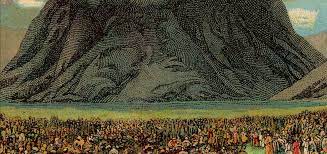Last week, I offered the idea, based on the three Hebrew words, shiluach, yetziah and geirush, used to describe both the exodus account and a marriage’s dissolution, of Yetzias Mitzrayim as Klal Yisrael’s “divorce” from Egypt and Har Sinai, as its subsequent “betrothal” to Hashem.
The latter image, in fact, is clear from the Midrash Rabbah (Acharei Mos 20:10), which comments on the words “the day of his marriage” in Shir HaShirim (3:11): This, comments the Midrash, is Har Sinai.
And from the Mechilta D’Rabi Yishmael on Yisro, which quotes Rabi Yehuda as explaining that “Hashem from Sinai came” (Devarim 33:2) conveys the image of “a groom going out to receive his bride.”
The chuppah at a Jewish wedding recalls (“bisachtis hahar,” Shemos 19:17) the mountain lifted over the head of the people at Sinai; the candles borne by parents, the lightning; the groom walking forward to greet his bride, the aforementioned Mechilta.
And the end of the birchas eirusin at a Jewish wedding refers to Hashem as having “sanctified His people Israel through chuppah and kiddushin.” Not “with the mitzvos of chuppah and kiddushin, but through those things themselves – namely, at Sinai.
But the mountain above the people is also understood by Chazal as a threat. Rav Avdimi bar Chama bar Chasa says that “Hashem overturned the mountain above the Jews like a barrel and said to them: ‘If you accept the Torah, good; but if not, there will be your burial’” (Shabbos 88a).
Although that intimidation was mitigated later in history, when, in the time of Esther and Mordechai, the people re-accepted the Torah entirely willingly [ibid], what is the significance of the coercion in the first place?
The answer may lie in Devarim 22: 28-29, where the law is set down in the case of a man who forces himself upon a young woman. He is fined the sum of fifty silver coins but also must (if the woman wishes) marry her and, unlike in any other marriage, cannot ever divorce her.
The implication for Hashem’s relationship with Klal Yisrael should be self-evident.
© 2022 Rabbi Avi Shafran
